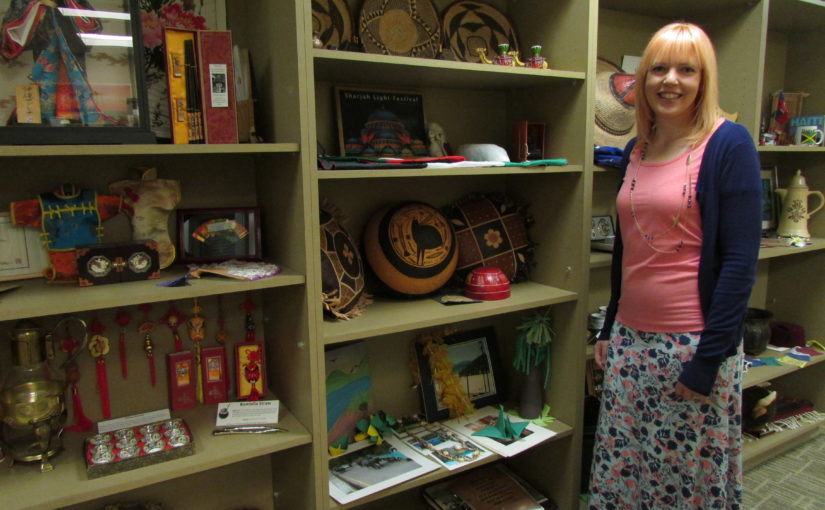Almost every week The Spectrum has “A Bison Abroad” article sharing a student’s amazing experiences. If you’re not convinced, just check out the article in this very issue. Doesn’t it make you wonder how you can have a once-in-a-lifetime experience? I was curious so I interviewed Tanya Kramer, assistant director of Study Abroad/International Student and Study Abroad Services.
Throughout the interview she explained the steps students needed to take and gave advice for spending part of their academic career at NDSU in another country. Kramer was once an NDSU student who studied abroad, so she knows the difficulties of searching for and learning about the various programs offered.
At the Study Abroad office, located on the first floor of Memorial Union, they try to encourage students to begin thinking about studying abroad early so they can make plans with their academic and study abroad advisers.
Kramer encourages students to talk to their adviser so they can help them figure out how to map their required classes around studying abroad while still being able to graduate on time. After this, Kramer explained, “Then they (students) can stop in to see a peer mentor, which is walk-in appointments where they go over general, give them resources, show them the site, and then help look at different program options.”
Kramer acknowledges that students have a lot to consider when selecting a program saying, “There’s a lot of things that go into it like finances, academics, what they’re looking for in the country that they’re looking to go to — the length of time, because that can vary.”
“It’s really just narrowing it down to what program is a good fit for them,” Kramer said.
Trying to figure out how to afford studying abroad can seem scary, but students are able to apply for financial aid and scholarships to help them fulfill their travel desires. Some students feel overwhelmed with the many program options and having to choose the right one, so the office gives them a feature and cost comparison tool to figure out how to maximize what they would be able to get out from the different experiences. One thing for students to consider is the length of the program with study abroad programs available that range from 10 days to three semesters. After figuring out the financial details and applying for the program, there is a “pre-departure” session where study abroad advisers help prepare the students for the adventure they are about to embark on.
The cost of airfare is another thing students should consider when thinking about finances and how long they would like to be abroad. Airfare prices are the most expensive part of studying abroad, so the time spent to the price of airfare should be considered.
One of the benefits for studying abroad is that students receive credit while doing so. Students can earn anywhere from one to full time credit. Students would earn one credit for a shorter program while receiving “full-time student” status, about twelve or more credits, for semester long programs.
There are all kinds of programs for students wanting different experiences. A faculty-led program is where a student takes a class and travels with a professor, making the class more “on the move.” There is also the option of taking classes abroad at a university.
Worried you might not graduate on time if you study abroad? “It doesn’t have to affect it at all,” Kramer said. Planning is key when it comes to studying abroad and still graduating on time. If you plan and have good flexibility within you major, it is quite easy. If you have no flexibility in your major, you might think about completing general education classes abroad instead of major specific requirements.
Still worried? “A lot of our students stay on track for graduation. The shorter-term programs are nicer, so like a spring break, winter break, or summer program are nice because they guarantee to not get them off track and actually probably add credits to move them along faster,” Kramer says to quell your worries.
When asked what’s the biggest benefit of studying abroad, Kramer responded by saying, “The biggest thing is that people have a self-satisfaction — they did it and they did it kind of all by themselves. They went to this whole other place and they were able to have this opportunity and accomplish it, so they feel a lot more confident and independent.”
Studying abroad can also help students boost their resumes, as only about 2-3 percent of NDSU students study abroad. “People can talk about being able to interact with people of diverse backgrounds and communicating effectively through barriers,” Kramer said.
I know I would worry about missing friends and family, so I asked how advisers prepare students for their time away from them. Kramer responded, “A lot of people that might actually be the barrier to study abroad is thinking about all the things that they’re missing out on here — their family, friends, whatever they’re doing — to keep in mind how many years in their life do they have to do all these things.” She also explained how people are in communication all the time now thanks to Wi-Fi, so students don’t have to miss their loved ones too much.
Kramer’s advice to anyone wanting to study abroad is, “Keeping an open mind — even if you don’t like one aspect of it — it’s fine because it will be over. Make the most out of what you experience.”
If there is any part of you wanting to study abroad, then go to the study abroad office. There you can find more information about the process of studying abroad. The peer mentors will help you figure out what you want to do. If you are still second guessing it, remember that, according to Kramer, “Most people come back saying it was the absolute best thing they’ve ever done, and they hope to do it again.”
